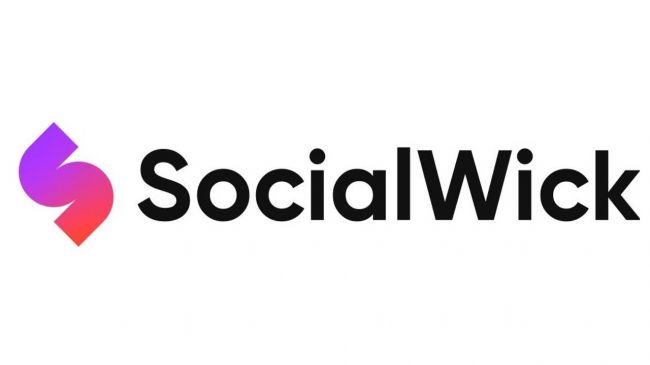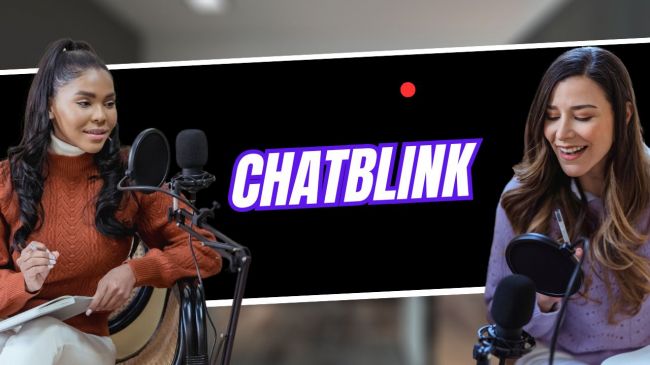On This Page
- What Does FYP Mean in Social Media?
- When Did the Term “FYP” First Become Popular?
- How TikTok Made FYP Part of Everyday Slang
- Why Do Users Comment “FYP” on Random Videos?
- Does Seeing Your Own Video on FYP Mean You’re Going Viral?
- How TikTok’s FYP Differs From Its Following Feed
- Do Captions and Sounds Matter More Than Hashtags on FYP?
- What Role Does Watch Time Play in FYP Ranking?
- Can Deleted or Private Videos Still Affect Your FYP?
- Is the Instagram Reels Feed Basically an FYP Copy?
- How YouTube Shorts Recommendation Engine Rivals TikTok’s FYP
- Does Using #FYP Hashtag Actually Help, or Is It a Myth?
- Why Some Creators Think FYP Is “Rigged”
- Can Fake Likes and Bots Trick the FYP Algorithm?
- FYP Shadowbanning: Myth or Reality?
- How Brands Hack the FYP for Viral Campaigns
- Case Studies: Products That Went Viral Thanks to FYP
- Is FYP Safe for Teenagers and Kids?
- How FYP Shapes Viral Trends and Internet Culture
- Will the FYP Survive If TikTok Gets Banned?
- The Future of FYP: Personalization vs. Privacy Concerns
- Final Thoughts: Does FYP Still Matter in 2025?
What Does FYP Mean in Social Media?
When I first saw “FYP” on TikTok, I thought it was just another random acronym. But “FYP” stands for For You Page, TikTok’s personalized feed where content is curated by its recommendation algorithm. According to Merriam-Webster, it’s “a social media feed that contains personalized content based on the user’s interests.”
This means the FYP isn’t just a trending hashtag—it’s the core of TikTok’s design, shaping what we watch, how trends spread, and which creators rise overnight.
When Did the Term “FYP” First Become Popular?
The term FYP started trending alongside TikTok’s rise in 2019–2020. Before that, apps like Instagram had “Explore Pages,” but TikTok turned “FYP” into cultural slang. As PlannThat’s glossary explains, FYP quickly became a goal for creators because landing there meant exponential exposure.
How TikTok Made FYP Part of Everyday Slang
Unlike traditional feeds, TikTok opened its app on the For You Page instead of a following feed. That simple decision made “FYP” shorthand for “going viral.” Even Hootsuite’s social media glossary notes that TikTok embedded FYP into internet culture so deeply that even non-creators use it casually.
Why Do Users Comment “FYP” on Random Videos?
When I first saw people comment just “FYP” under videos, I was confused. Turns out, many users believe writing “FYP” helps push videos into more feeds. While TikTok hasn’t confirmed that, SocialPilot explains that engagement—comments, shares, likes—does influence algorithmic ranking, so users spam “FYP” in hopes of boosting visibility.
Does Seeing Your Own Video on FYP Mean You’re Going Viral?
Not necessarily. Recurpost clarifies that everyone sees their own videos on FYP. True virality only happens when your video surfaces in thousands of strangers’ feeds, not just yours. I learned this firsthand when my video showed up on my own FYP but barely reached new audiences.
How TikTok’s FYP Differs From Its Following Feed
On TikTok, you have two main feeds: “Following” and “For You.” The Following Feed is limited to creators you already follow, while the FYP introduces strangers’ content based on algorithm predictions. Sprinklr’s glossary explains this is why TikTok is so addictive—it constantly recommends content outside your circle.
Do Captions and Sounds Matter More Than Hashtags on FYP?
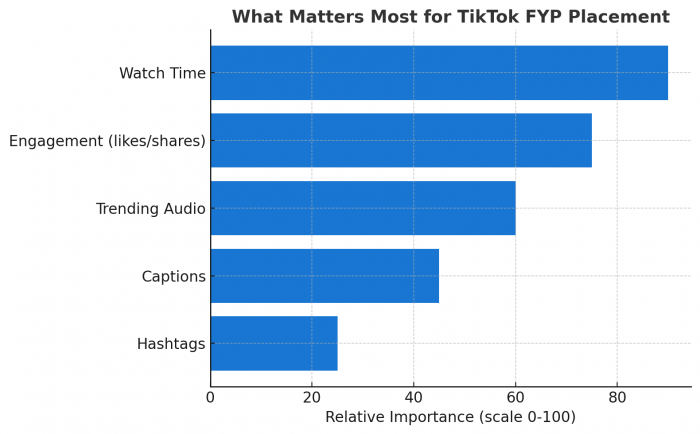
From my experience and insights from Captions.ai, hashtags like #FYP alone don’t guarantee visibility. Instead, captions and trending sounds have more influence. The algorithm weighs video completion rates and sound popularity heavily. So a funny video with the right trending audio can outperform a perfectly hashtagged one.
What Role Does Watch Time Play in FYP Ranking?
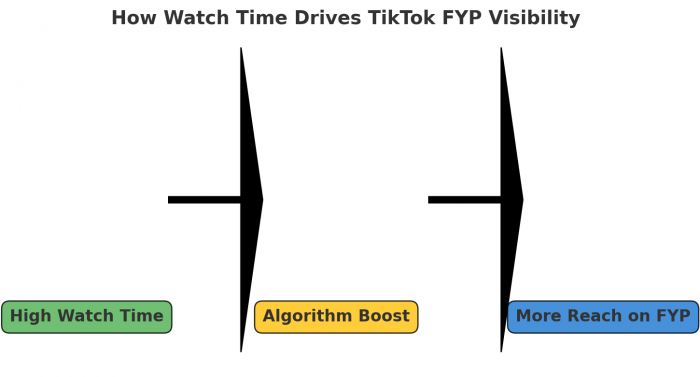
Watch time is critical. Brandwatch points out that TikTok prioritizes videos that people finish—or even rewatch. I’ve noticed this too: my short, looping clips that people watch multiple times perform much better on FYP than longer videos.
Can Deleted or Private Videos Still Affect Your FYP?
According to community discussions on Quora, deleted videos no longer contribute to FYP reach. However, private videos can still affect your engagement history, which influences future recommendations. This means even what you hide plays into your overall algorithm profile.
Is the Instagram Reels Feed Basically an FYP Copy?
Yes—Instagram’s Reels feed is clearly inspired by TikTok’s FYP. Linktree’s blog argues that TikTok set the template for “discovery feeds,” and now every platform, from Instagram to YouTube Shorts, has adopted the model. The difference? TikTok still feels more personalized than Instagram’s Reels Explore.
How YouTube Shorts Recommendation Engine Rivals TikTok’s FYP
YouTube Shorts has a powerful algorithm of its own, but as Loomz.ai explains, Shorts still leans heavily on YouTube’s history of personalization across longer videos. TikTok’s FYP, meanwhile, is laser-focused on micro-content discovery.
Does Using #FYP Hashtag Actually Help, or Is It a Myth?
The hashtag #FYP is everywhere, but Dictionary.com clarifies it’s more of a cultural trend than an actual algorithm trigger. TikTok hasn’t confirmed that hashtags like #FYP influence placement. I’ve used #FYP plenty of times, but the videos that performed best were the ones with strong engagement, not just the hashtag.
Why Some Creators Think FYP Is “Rigged”
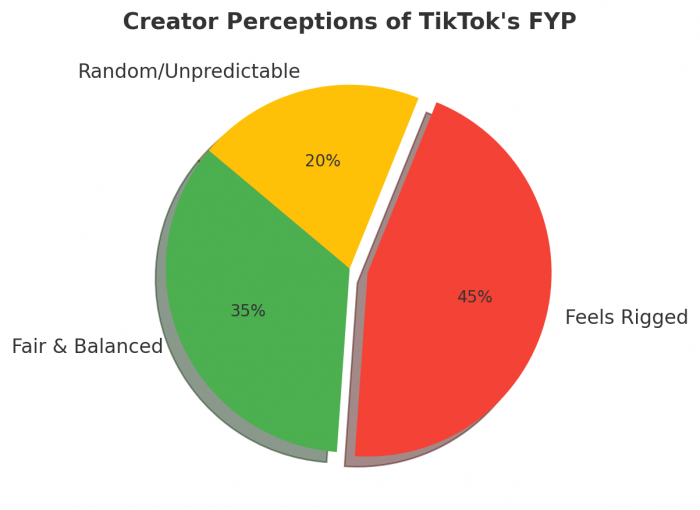
On Reddit TikTok discussions, some creators vent that TikTok favors big accounts or suppresses small ones. While there’s no proof, the perception of bias exists. Gabb’s blog notes that TikTok’s lack of transparency fuels these doubts.
Can Fake Likes and Bots Trick the FYP Algorithm?
In theory, engagement farming might give a temporary boost. But TikTok actively combats this with bot-detection. Sprinklr reports that artificial engagement is often detected and penalized, which means real, organic activity is the only sustainable way to land on FYP.
FYP Shadowbanning: Myth or Reality?
Many creators talk about being “shadowbanned.” Pinterest boards on FYP often mention drops in views. TikTok denies shadowbanning, but in practice, videos with flagged content (copyrighted music, spammy hashtags) often vanish from FYP visibility.
How Brands Hack the FYP for Viral Campaigns
Brands know FYP is gold for visibility. Captions.ai shows that successful campaigns lean into native trends—memes, trending audios, and authentic user-generated content—rather than polished ads. For small businesses, even one viral FYP feature can be game-changing.
Case Studies: Products That Went Viral Thanks to FYP
From leggings to kitchen gadgets, countless products have gone viral via TikTok’s FYP. Recurpost highlights how FYP can create overnight sensations—proof that placement can turn obscure products into household names.
Is FYP Safe for Teenagers and Kids?
This is one of the most important concerns. Gabb raises valid points: since FYP curates based on engagement, kids may see content that isn’t age-appropriate. While TikTok has parental controls, the unpredictability of FYP makes it less safe than supervised feeds.
How FYP Shapes Viral Trends and Internet Culture
TikTok’s FYP doesn’t just recommend content—it creates culture. Brandwatch notes that dances, memes, and audio trends all spread through FYP. Even creators who didn’t chase virality sometimes find themselves at the center of trends.
Will the FYP Survive If TikTok Gets Banned?
With TikTok facing bans in some countries, platforms like Instagram and YouTube are poised to absorb its FYP-like model. Loomz.ai predicts the FYP concept is here to stay—even if TikTok isn’t.
The Future of FYP: Personalization vs. Privacy Concerns
The biggest question: how much personalization is too much? Hootsuite’s glossary points out that users love tailored feeds, but privacy advocates worry about how much data fuels the algorithm. Personally, I find FYP addictive, but it’s clear the balance between personalization and privacy will define its future.
Final Thoughts: Does FYP Still Matter in 2025?
After exploring definitions from PlannThat, insights from Sprinklr, Hootsuite, and Brandwatch, my answer is simple: yes, FYP still matters more than ever.
It’s not just a feed—it’s the cultural engine of TikTok and the model other platforms are copying. Whether you’re a casual user or a creator, understanding FYP is the key to understanding how social media works today.
Post Comment
Be the first to post comment!


